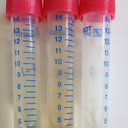Molecular characterization of tobacco squalene synthase and regulation in response to fungal elicitor.
कीवर्ड
सार
The enzyme squalene synthase (SS) represents the first commitment of carbon from the general isoprenoid pathway toward sterol biosynthesis and is a potential point for regulation of sterol biosynthesis. The isolation and characterization of tobacco (Nicotiana tabacum) squalene synthase (TSS) cDNA and genomic DNA clones, as well as determination of the steady state level of TSS mRNA in response to elicitor treatment, were investigated. cDNA clones for TSS were isolated from poly (A)+ RNA using a reverse transcription/polymerase chain reaction (RT/PCR) method. A 1233-bp cDNA clone was generated that contained an open reading frame of 411 amino acids giving a predicted molecular mass of 46.9 kDa. Comparison of the TSS deduced amino acid sequence with currently described SS from different species showed the highest identify with Nicotiana benthamiana (97%), followed by Glycyrrhiza glabra (81%), Arabidopsis thaliana (74%), rat (40%), and yeast (37%). Expression of a soluble form of the TSS enzyme with enzymatic activity in Escherichia coli was achieved by truncating 24 hydrophobic amino acids at the carboxy terminus. Characterization of genomic TSS (gTSS) revealed a gene of 7.086 kb with a complex organization of small exons and large introns not typical of plant genes. Southern blot hybridization indicated only two copies of the SS gene in the tobacco genome. Treatment of tobacco cell suspension cultures with a fungal elicitor dramatically reduced TSS enzymatic activity, lowering it to zero within 24 h. Analysis of TSS mRNA levels, by RNA blot hybridization and primer extension assays, in elicitor-treated cells indicated that the transcript level remained largely unchanged over this 24-h period. These results suggest that the suppression of TSS enzyme activity in elicitor-treated cells may result from a posttranscriptional modification of TSS.


